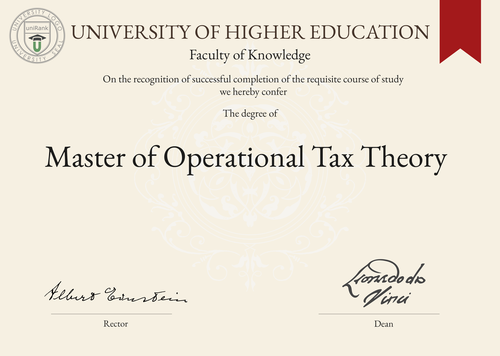
Master of Operational Tax Theory (MOTT)
Guide to Master of Operational Tax Theory Program/Course/Degree
Master of Operational Tax Theory (MOTT)

Program Name:
Master of Operational Tax TheoryProgram or Degree abbreviation:
MOTTDuration range:
Varies by country and university (typically 1-2 years)Tuition range:
Varies by country and university (typically $10,000-$30,000 per year)Overview:
The Master of Operational Tax Theory program is designed to provide students with a comprehensive understanding of tax theory and its practical applications in operational settings. This program equips students with the necessary knowledge and skills to navigate the complex world of taxation and contribute to effective tax planning and compliance strategies.Curriculum Overview by year:
Year 1: - Introduction to Taxation - Tax Law and Policy - Tax Planning and Strategy - International Taxation - Tax Accounting and Reporting Year 2: - Advanced Taxation Topics - Tax Research and Analysis - Tax Compliance and Auditing - Tax Technology and Systems - Elective Courses (varies by university)Key Components:
- In-depth study of tax theory and its practical applications - Understanding of tax laws and regulations - Development of tax planning and compliance strategies - Knowledge of international taxation principles - Proficiency in tax accounting and reporting - Familiarity with tax research and analysis techniques - Awareness of tax compliance and auditing processes - Exposure to tax technology and systemsCareer Prospects:
Graduates of the Master of Operational Tax Theory program can pursue various career paths in both public and private sectors. Potential job roles include tax consultant, tax analyst, tax manager, tax auditor, tax attorney and tax policy advisor. They can find employment opportunities in accounting firms, multinational corporations, government agencies and consulting firms.Salary Expectations:
Salaries for professionals with a Master of Operational Tax Theory degree can vary depending on factors such as location, industry, experience and job role. On average, graduates can expect competitive salaries ranging from $60,000 to $100,000 per year. For a more accurate understanding of salary expectations, you can utilize the Job Sites Search Engine, from our sister site jobRank, which searches over 4,600 job sites worldwide. Make sure to specify not only the job title but also the country you are interested in.Conclusions:
It is important to note that the duration, tuition fees, curriculum, key components, career prospects and salary expectations of the Master of Operational Tax Theory program can vary based on the chosen country or location of study, as well as the chosen university. Prospective students are advised to research and compare different programs and institutions to find the best fit for their individual goals and circumstances. Visitors interested in pursuing a Master of Operational Tax Theory degree can use the uniRank World Universities Search Engine to explore and find universities offering this specific degree program anywhere in the world.World Universities Search Engine
search for Master of Operational Tax Theory (MOTT) and add the Location (country, state etc.) or specific University you are interested in studying at.
Query examples:
- Master of Operational Tax Theory (MOTT) United States
- Master of Operational Tax Theory (MOTT) United Kingdom online
- Master of Operational Tax Theory (MOTT) Australia international students
- Master of Operational Tax Theory (MOTT) University of California
- Master of Operational Tax Theory (MOTT) University of London tuition fees
- Master of Operational Tax Theory (MOTT) University of Sydney scholarships
Share Program/Course
Interesting? Share this program/course/degree info with your friends now.